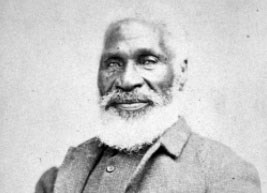Documentary filmmaker Jarod A. Brock has written a sweeping true story and created a documentary film of a slave who inspired Harriet Beecher Stowe’s Uncle Tom’s Cabin.
Josiah Henson, a former black slave and Methodist preacher, bore an uncanny resemblance to Stowe’s titular character. Henson was physically and mentally a strong man, and endured massive suffering that broke lesser men.
But Henson successfully escaped to Canada with his family, and at his peril returned numerous times to the United States to aid other slaves.
Morinville Public Library screens Josiah on Wednesday, May 30 at 6 p.m. Registrations accepted until May 29.
“My goal is to reintroduce Josiah in to the abolitionist pantheon where he belongs. Secondly, I want to help redeem the story of Uncle Tom’s Cabin. It’s become a derogatory term. I want to open the conversation and make it a good thing,” said Brock.
The filmmaker/author first became curious about Henson four years ago after reading Uncle Tom’s Cabin.
“I wanted to know more about it. I researched and googled it. In it I met a throwaway line on Josiah Henson. I was surprised. I’d lived two hours from where he lived and never heard of him,” said Brock.
Josiah Henson was born near Port Tobacco, Maryland around 1789 as a slave and was owned by several plantation owners. When he attempted to buy his freedom, his owner cheated him. Henson then escaped with his wife and children, walking 600 miles to Canada.
His first memory was of his father being whipped as punishment for striking a white man who tried to rape his mother. After being whipped Henson’s father’s ear was cut off and he was sold to a southern plantation.
A drunken alcoholic named Isaac Riley enslaved Henson and his mother, and the young boy endured countless beatings – especially after he tried to learn to read.
At some point, one of his overseers broke his shoulders and arms. Henson did not heal properly and for the rest of his life, Henson could not lift his arms above his shoulders, said Brock.
His mother begged him to go to church. Henson refused fearing he would receive more beatings.
“But Josiah goes to Isaac who laughs it off and says sure. He goes to this evolutionist preacher and learns that Christ died for all men, not just white, but black men too. He learned Christ died not just for rich men, but for poor men and slaves. He later becomes a minister and his faith propels him to do good works.”
Although he couldn’t read, Henson learned the skills of running a business and as a preacher, he memorized verses and relied on his natural eloquence and leadership abilities to connect with people.
He earned $350 from preaching and went to Riley offering to pay him another $100 for his emancipation. Riley swindled him out of the money and added another zero to the original $100 offer.
In 1830, Henson ran away with his wife and children to Canada. After 10 years of living in Canada, Henson started a freeman settlement call the British America Institute in an area called Dawn.
It became one of the final stops of the Underground Railway and Henson repeatedly returned to the United States to guide 118 other slaves to freedom.
Danny Glover narrates this tale of a heroic man nearly forgotten by history.




